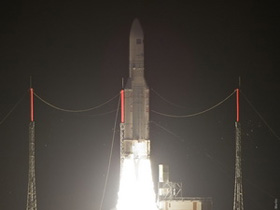New fuel helps rocket-friendly environment
Missile fuel has remained virtually unchanged over the past 50 years since the launch of Sputnik's first artificial satellite.
But a new type of compound between nano-grade aluminum and freezing water could make rocket launches more environmentally friendly, even allowing spacecraft to re-supply in distant places like Moon or Mars.
This hybrid fuel, known as ALICE, can propel missiles through a chemical reaction between water and aluminum.

ALICE mixed fuel helps rocket launchers more environmentally friendly.(Artwork: AFP / VNA)
Scientists hope that the hydrogen products obtained from this reaction can serve other purposes than rocket launchers, while also filling and increasing the power of hydrogen fuel cells, the only feasible technology. most power supply to spacecraft systems during long flights.
The idea of pushing missiles to space with only water and aluminum attracted the attention of the US National Aeronautics Agency (NASA) and the Office of Scientific Research of the US Air Force, two agencies that funded these Initial development phase of this new fuel and engine.
"We are aiming for a technology that can store hydrogen for a long time and water is a reasonable and stable way to do this," said Professor of Mechanical Engineering Steven Son. .
According to him, there have been previous attempts to study nanoscale aluminum and water, but this is the first time that research has been transformed into a 'practical' missile launch.
The new ALICE system was successfully tested in August in the launch of a rocket of about 426m. With this success, ALICE and similar fuels are likely to be widely used in the future.
One of the reasons is the discovery of water on Mars and the Moon, as well as the possibility of water on some of Jupiter and Saturn's moons. In such conditions, being able to produce fuel from reliable sources can make the difference between failure and success of a mission in these objects.
- Turn urine into rocket fuel
- Successfully produced environmentally friendly dry alcohol
- How to transport 30-ton rocket fuel tanks across residential areas
- Turn human waste into rocket fuel
- Put medicine in your body ... by rocket
- Miniature spoons to save aircraft fuel
- Flying from Los Angeles to San Francisco uses tallow fuel
- What happens inside the rocket when taking off?
- New environmentally friendly fuel space
- 'Green' fuel car - the solution to the environment
- Apply nano additives to save fuel
- China's satellite has enough fuel on Earth
 Van Allen's belt and evidence that the Apollo 11 mission to the Moon was myth
Van Allen's belt and evidence that the Apollo 11 mission to the Moon was myth The levels of civilization in the universe (Kardashev scale)
The levels of civilization in the universe (Kardashev scale) Today Mars, the sun and the Earth are aligned
Today Mars, the sun and the Earth are aligned The Amazon owner announced a secret plan to build a space base for thousands of people
The Amazon owner announced a secret plan to build a space base for thousands of people